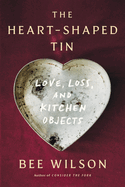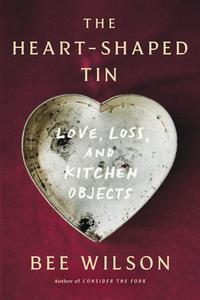
 British food journalist Bee Wilson turns her keen eye on kitchenware--and the deep emotions it engenders--in her engaging, insightful ninth book, The Heart-Shaped Tin: Love, Loss, and Kitchen Objects. Wilson (The Secret of Cooking; First Bite) delves into the varied roles of cherished kitchen objects: gifts from loved ones, emblems of a bygone time (such as a baby's pre-solid-food stage), mementos of a past relationship or a faraway home, and even faddish purchases that eventually become junk. She draws together meticulous research; interviews with chefs, immigrants, and others who hold dear their often-used kitchenware; and her own experience of living with (and using) her kitchen paraphernalia as she navigated her divorce, her mother's dementia and death, and her two older children leaving home.
British food journalist Bee Wilson turns her keen eye on kitchenware--and the deep emotions it engenders--in her engaging, insightful ninth book, The Heart-Shaped Tin: Love, Loss, and Kitchen Objects. Wilson (The Secret of Cooking; First Bite) delves into the varied roles of cherished kitchen objects: gifts from loved ones, emblems of a bygone time (such as a baby's pre-solid-food stage), mementos of a past relationship or a faraway home, and even faddish purchases that eventually become junk. She draws together meticulous research; interviews with chefs, immigrants, and others who hold dear their often-used kitchenware; and her own experience of living with (and using) her kitchen paraphernalia as she navigated her divorce, her mother's dementia and death, and her two older children leaving home.
Wilson recounts the incident that sparked the book: the titular heart-shaped tin, an enduring symbol of her marriage, fell out of its cupboard just months after her husband left her. Wilson kept the tin, but knew she wasn't yet ready to use it for any new, post-divorce occasions. Instead, she began searching for other people who harbored "intense and even magical feelings" about their kitchen items. She found a wealth of such people, and she records their stories with care: the food writer who started using the best china after her husband became seriously ill; the Venezuelan woman who treasured the budare pan her father gave her when she moved to Spain; the cookbook seller in New York who reveres her Polish mother's tomato-shaped salt shaker.
As she describes the objects and examines the meaning they hold for their owners, Wilson broadens her exploration to well-known cooking artifacts, such as the "poetry jars" made by enslaved American potter David Drake in the mid-19th century. She muses on cultural associations with cooking and serving food, but also with owning prestige objects (like her mother's cream-colored Aga stove), even if they are seldom used. Throughout the narrative, Wilson chronicles her mother's descent into dementia, and the kitchen-related family memories stirred up by packing up her mother's house. On a happier note, Wilson also remembers her grandfather and describes her joy in a whimsical blue Wedgwood teapot he designed.
Like all cared-for objects, kitchen items provoke strong feelings both particular and universal. Wilson's heart-shaped tin finally gets its redemptive turn when Wilson bakes her own milestone birthday cake in it. As she shares the cake with her children, she honors her mother by pulling out a set of platters her mother had cherished but never used.
Poignant, thought-provoking, and lavishly detailed, The Heart-Shaped Tin is a moving tribute to the objects that shape our lives in (and out of) the kitchen. --Katie Noah Gibson, blogger at Cakes, Tea and Dreams
Shelf Talker: Bee Wilson's poignant, insightful ninth book examines the complicated layers of meaning imbued in kitchen objects by their owners.

